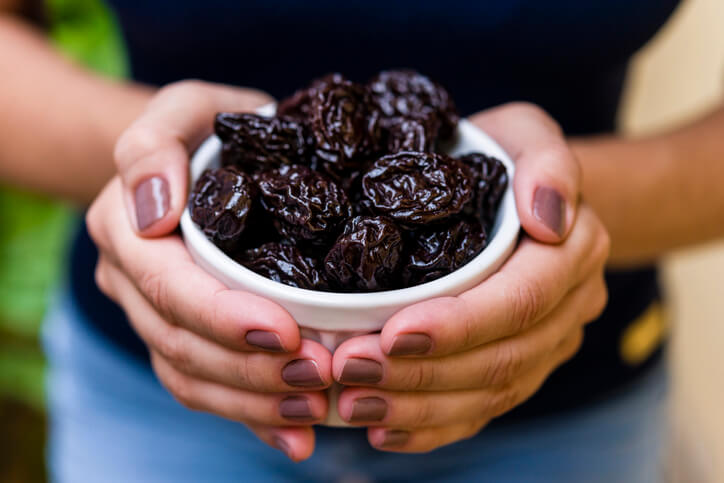
The Power of Prunes
By Joy Stephenson-Laws, JD, Founder
Here are some fun facts which I recently became aware of. As many as "63 million people in North America meet the diagnostic criteria for chronic constipation." And there are many studies which demonstrate that "the prevalence of constipation increases with age and is more common in women than men."
“Constipation, one of the most common gastrointestinal complaints in the United States, occurs when the colon absorbs too much water or if the colon's muscle contractions are slow or sluggish, causing the stool to move through the colon too slowly,” according to one source.
There are various reported causes of constipation. Certain medical conditions like diabetes, thyroid disorders or pregnancy may cause constipation. Even medications "such as pain medications (narcotics), blood pressure medications (calcium channel blockers), anti-seizure medication, and antispasmodics" may lead to constipation. And in "people over 50, a more serious bowel disease or a structural disorder could cause the onset of constipation." So needless to say, if you are constipated, it is always important to see a competent health care professional to identify the cause.
One way to address constipation issues is to eat prunes. In fact, many people think of prunes for their laxative effects. Prunes are just dried plums and are they sweet in taste.
In one recent study, researchers explored the effect of prunes on stool output, gut microbiota and more. Study participants consisted of 120 healthy adults who had low fiber intakes and a stool frequency of three to six stools per week. For four weeks, participants were randomly assigned to one of the three regimens listed below:
- 80 grams of prunes (which is about eight prunes) along with 300 milliliters of water (a nutrient that also helps prevent constipation) per day.
- 120 grams of prunes and 300 milliliters of water per day.
- No prunes and 300 milliliters of water per day (the control group).
Basically, the results revealed that compared to the control group, the prune groups had more frequent stools and greater stool weight. The prune groups also had higher amounts of bifidobacterium in their guts.
“Members of the genus Bifidobacterium are among the first microbes to colonize the human gastrointestinal tract and are believed to exert positive health benefits on their host. Due to their purported health-promoting properties, bifidobacteria have been incorporated into many functional foods as active ingredients,” reports the National Institutes of Health (NIH).
(A recurring topic of discussion for us here at pH Labs is the gut microbiome - those trillions of microbes (also called flora, bacteria or bugs) that live in our guts. Some of these gut bugs are good, and some are bad. Clearly, you want more of the good bugs and you also want diversity in your gut. Not having a diverse population of the good bugs in your gut can negatively impact your mental health, weight, immune function, ability to absorb nutrients from the foods you eat and overall digestive health and even the risk of developing cancer. There is even evidence that some 50 disorders (such as irritable bowel syndrome (IBS), are associated with an “out of whack” gut microbiome).
So if prunes can help get your gut bugs in check and possible aid in things like weight control and immune function, I’m in!
It should be understood that there is more to being constipated than just feeling uncomfortable and frustrated because you can’t seem to be going to the bathroom as much as you perhaps should.
According to research from the American College of Gastroenterology (ACG), having chronic constipation has been linked to an increased risk of colorectal cancer.
“The postulated causal link between constipation and increased colorectal cancer risk is that longer transit times increase the duration of contact between the colonic mucosa and concentrated carcinogens in the lumen, such as bile acids or other carcinogens," said one of the lead researchers, in this report.
Prunes are a good source of fiber, a very important nutrient known to help prevent constipation.
Several studies have provided some evidence that suggests that people who have an adequate intake of dietary fiber may have a lower risk of developing colorectal cancer. And from a preventative standpoint, this is great.
Fiber may also help combat hunger pangs and make you feel more full throughout the day. If you are looking to lose weight this year, getting more fiber into your diet is a great way to help achieve this goal. The sweet taste of prunes may even help curb sugar cravings.
One study found evidence which suggested that eating punes may help with weight loss. Prunes may suppress hunger, which can help you lose weight or maintain a healthy weight by preventing overeating. The fiber in prunes may also help reduce stomach bloating, and this can help you look slim and feel good.
Not only were prunes proven to be effective because of the fiber content, but because they are a dried fruit, the researchers noted how convenient they were for the participants. And when a healthy habit is convenient, it is extremely successful. You can throw prunes in your gym bag or purse.
As with any food you want to incorporate into your diet, speak with a competent healthcare professional about whether prunes are appropriate for you - especially if you take medications.
And if you still don’t think prunes are sexy, check out these stars who do!
Enjoy your healthy 'constipation-free' life!
The pH professional health care team includes recognized experts from a variety of health care and related disciplines, including physicians, attorneys, nutritionists, nurses and certified fitness instructors. This team also includes the members of the pH Medical Advisory Board, which constantly monitors all pH programs, products and services. To learn more about the pH Medical Advisory Board, click here.







